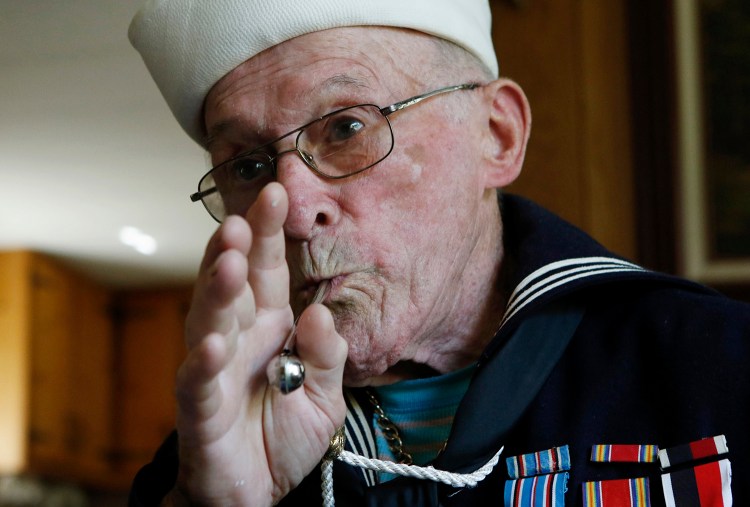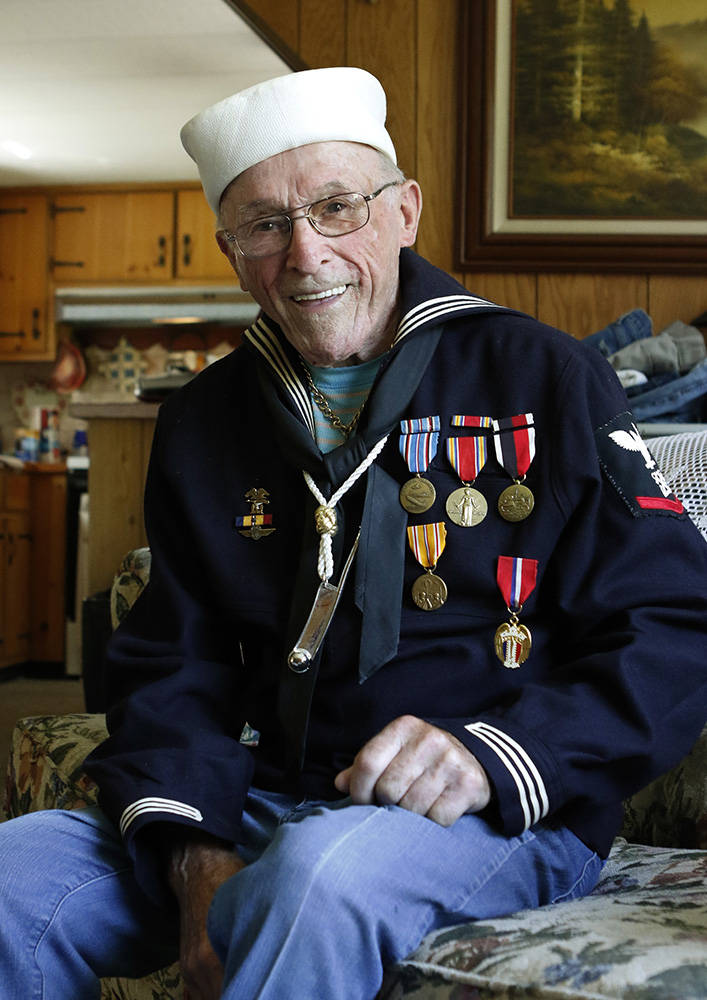TOPSHAM — It was 70 years ago, but Conrad Lebourdais’ memories of his days on a U.S. attack cargo ship running between the Philippines and Japan are sharp and clear.
Lebourdais, 89, was serving on the USS Medea in the Pacific when the U.S. dropped nuclear bombs on Hiroshima and Nagasaki in early August 1945. That led to Japan’s surrender on Aug. 15 and a formal surrender ceremony Sept. 2.
The Brunswick native watched the ceremony on the USS Missouri from his post 300 yards away on the deck of the Medea behind a 40 mm gun.
“You didn’t know what the Japanese would get up to at the ceremony,” Lebourdais explained during an interview Sunday at his home in Topsham.
Lebourdais is among the dwindling ranks of American veterans of World War II who are now looking back on the waning days of the global conflict seven decades ago.
For Lebourdais, one of 18 children, the war began when he was 17 and working in a mill in Brunswick. His father accompanied him to the Navy recruitment office to provide a signature for his son. Because Lebourdais was not yet 18, he needed parental consent to join up.
He went off to boot camp in Sampson, New York, and then on to the Medea, where he operated an amphibious landing craft, ferrying troops from the ship to land battles.
By August 1945, the ship was running supplies between Australia, New Caledonia, New Guinea, the Philippines and Japan.
Lebourdais remembers Aug. 6, when the captain came out on board in the Philippines as they loaded up the ship.
“Then he hollered, ‘We just received word we dropped the bomb on Hiroshima,'” said Lebourdais.
Three days later, the captain came back out to report the dropping of the atomic bomb on Nagasaki.
After the end of fighting in the Pacific, the Medea ferried occupation forces from the Philippines to Japan. It delivered provisions to the Japanese cities of Kure and Wakayama, downwind of Hiroshima. Lebourdais said there was some scuttlebutt among the men on board who had heard it was unsafe to work outside more than three or four hours a day, due to the high levels of radiation from the bombing. The men worked outside much longer than that. None of their officers warned them about the danger of nuclear fallout. At one point during liberty on shore, Lebourdais walked to see the ruins of Hiroshima. He believes those experiences caused the rare and dangerous tumor that was removed from his arm a decade ago.
The Medea was ordered to Tokyo Bay in the days leading up to the surrender ceremony. Lebourdais remembers picking up a Japanese pilot who guided the ship through the maze of mines planted throughout the bay.
On the day of the ceremony, Lebourdais watched the ceremony through binoculars.
“You could see the ship good. The ceremony went on for about 15 or 20 minutes,” he recalled.
He said a rumble started up in the sky and it quickly grew deafening as a thousand U.S. warplanes passed overhead.
“They were telling the Japanese, ‘If you don’t sign, we will drop everything on your heads.’ At least that is how I saw it,” said Lebourdais.
Lebourdais was discharged in 1946 and hightailed it home, arriving on the Fourth of July. He spent the next 42 years working at the Pejebscot Paper Co. in Topsham before retiring.
Now he builds decorative stone walls, customizes baseball bats and operates a yard sale at his house on Lewiston Road. He drives around in a distinctive red pickup truck decorated, in part, with doll’s heads and a poster of the Three Stooges – to keep the dolls company, he says.
Lebourdais retains his fighting spirit.
He recently launched a protest of the $30 admission fee being charged to get into the Great State of Maine Air Show at the Brunswick Executive Airport, where the Navy Blue Angels aeronautics team will fly on Sept. 5 and 6. In previous years, World War II veterans could get in for free.
Lebourdais fired off a letter to the editor, published in The Times Record in Brunswick last week, urging World War II veterans to boycott the show.
Lebourdais said letting veterans in free is the least the show operators could do for the fighters who rid the world of Adolf Hitler and Hideki Tojo.
“These guys will be lining their pockets,” Lebourdais said.
Send questions/comments to the editors.





Success. Please wait for the page to reload. If the page does not reload within 5 seconds, please refresh the page.
Enter your email and password to access comments.
Hi, to comment on stories you must . This profile is in addition to your subscription and website login.
Already have a commenting profile? .
Invalid username/password.
Please check your email to confirm and complete your registration.
Only subscribers are eligible to post comments. Please subscribe or login first for digital access. Here’s why.
Use the form below to reset your password. When you've submitted your account email, we will send an email with a reset code.